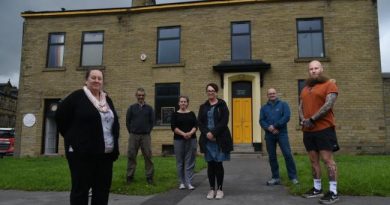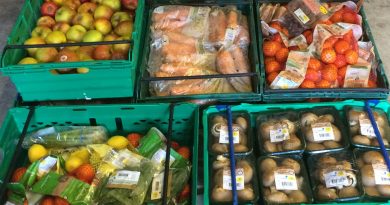Fences or Ambulances?
A reflection from Juli Thompson, originally written for the Grace+Truth blog.
I have worked for twenty years in Bradford tackling homelessness and food insecurity. Reading Grace+Truth over the years has helped me to reflect on the approach I have taken. It’s good to be self-critical and I have always been challenged by the thought that our work might be part of the problem rather than part of the solution.
Addressing poverty means holding tensions in balance: between charity and justice and also between serving and empowering people. Everything we do should seek to set captives free, not imprison them further!
Embarrassed
I often reflect on my experience as a working single parent in the 1980s when I was eligible for food vouchers. At the local Rotary Club, I could exchange my vouchers for two packs of European butter and two tins of stewed steak. The Rotarians were kind but I felt embarrassed and disempowered.
My work to address food poverty has been influenced by these experiences. In the churches where the foodbanks operated, we added to what was being done by making fresh fruit, vegetables and bread available. We also began teaching people to cook this kind of good, healthy food. This lead us to setting up food pantries where people pay a small amount for the food they need.
The move towards establishing a pantry model was mocked by some. I was told we just need to give away food parcels. Yet I kept hearing from God about setting the captives free. And food isn’t free. I saw that people, given a decent choice, don’t choose charity.
Against the tide
Our FoodSavers project offers high quality fresh and store cupboard food for a low weekly membership fee. But in establishing this work we have to had to go against the tide of the free food parcels being given out. We were told it would never take off. We were even accused of exploiting vulnerable people by charging a small membership fee. We were told poor people had no money so they would never be able to save into a Credit Union.
But this month’s figures in Bradford shows us 430 people have saved over £47,500 pounds this year. In addition, they have saved over £650,000 on their weekly shopping. In November we launched in Leeds and earlier this year we launched in Calderdale.
Empowering
Its exciting to see volunteers start to feel they are part of the solution, its exciting to hear people ask questions about the faith which motivates our work. And it exciting to see the dignity in people’s eyes as they are paying their membership.
Our pilot study in Bradford has painted a compelling picture of guests accessing the FoodSavers service feeling empowered to feed their families, pleased at having the choice and flexibility to pick their own food and grateful to contribute towards feeding themselves rather than relying on handouts. As one lady said:
I came in feeling suicidal and I am leaving feeling I have HOPE.
One of the positives that came from the pandemic is that poverty is not a dirty word anymore. It can no longer be swept under the charity carpet. The world has seen that the Church and faith groups have stepped up and made a difference. But we must keep stepping up and keep the focus on setting captives free.
Fences or ambulances?
I’ll end by sharing the first 2 stanzas of a poem by Joseph Malins, written in 1895:
Twas a dangerous cliff, as they freely confessed,
Joseph Malins
Though to walk near its crest was so pleasant;
But over its terrible edge there had slipped
A duke and full many a peasant.
So the people said something would have to be done,
But their projects did not at all tally;
Some said, “Put a fence ’round the edge of the cliff,”
Some, “An ambulance down in the valley.”
But the cry for the ambulance carried the day,
For it spread through the neighbouring city;
A fence may be useful or not, it is true,
But each heart became full of pity
For those who slipped over the dangerous cliff;
And the dwellers in highway and alley
Gave pounds and gave pence, not to put up a fence,
But an ambulance down in the valley.




